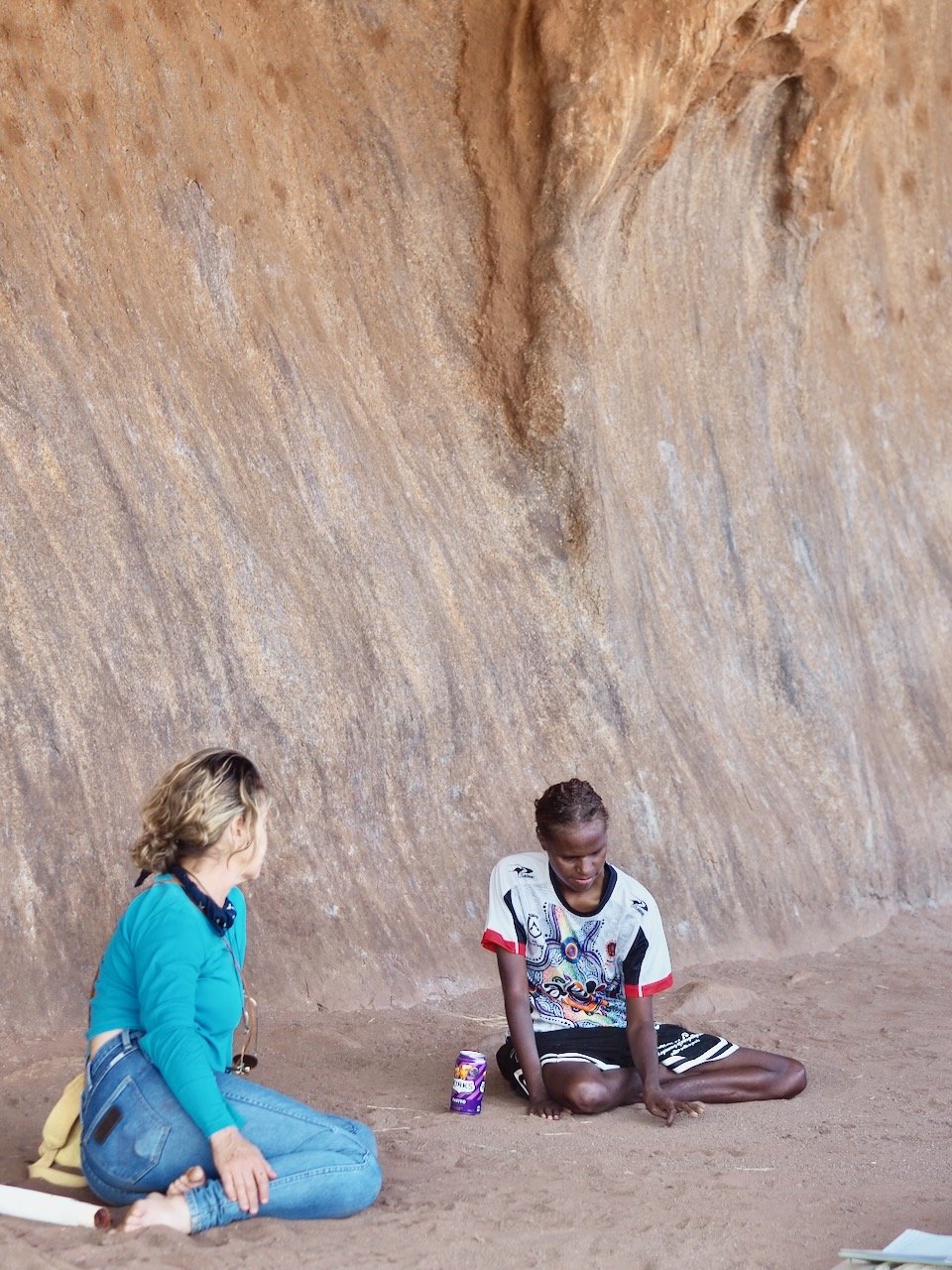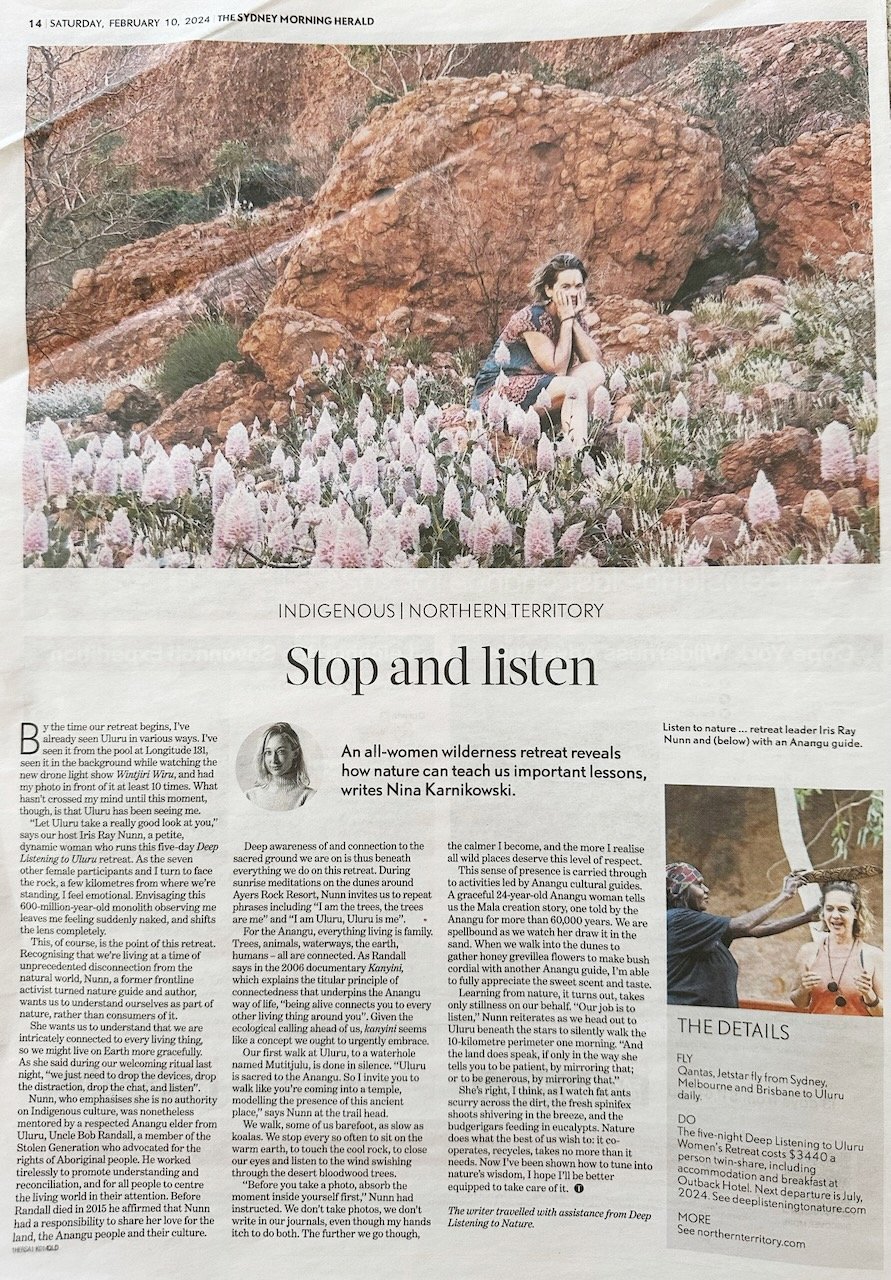DEEP LISTENING TO NATURE IN ULURU: SMH TRAVELLER
AN ALL-WOMEN WILDERNESS RETREAT REVEALS HOW NATURE CAN TEACH US IMPORTANT LESSONS, WRITES NINA KARNIKOWSKI.By the time our retreat begins, I’ve already seen Uluru in various ways. I’ve seen it from the pool at Longitude 131, seen it in the background while watching the new drone light show Wintjiri Wiru, and had my photo snapped in front of it at least 10 times. What hasn’t crossed my mind until this moment, though, is that Uluru has been seeing me.
“Let Uluru take a really good look at you,” says our host, Iris Ray Nunn, a petite, dynamic woman in her late 40s , who runs this five-day Deep Listening to Uluru retreat. As the seven other female participants and I turn to face the rock, a few kilometres from where we’re standing, I feel emotional. Envisaging this 600-million-year-old monolith observing me leaves me feeling suddenly naked, and shifts the lens completely.
This, of course, is the point of this retreat. Recognising that we’re living at a time of unprecedented disconnection from the natural world, Nunn, a former frontline activist turned nature guide and author, wants us to understand ourselves as part of nature, rather than consumers of it.
She wants us to understand that we are intricately connected to every living thing, so we might start living on Earth more gracefully. As she said during our welcoming ritual last night, “we just need to drop the devices, drop the distraction, drop the chat, and listen”.
Nunn, who emphasises she is no authority on Indigenous culture, was nonetheless mentored by a respected Anangu Aboriginal elder from Uluru, Uncle Bob Randall, a member of the Stolen Generation who advocated for the rights of Aboriginal people.
He worked tirelessly to promote understanding and reconciliation, and for all people to centre the living world in their attention. Before Randall died in 2015, he affirmed that Nunn had a responsibility to share her love for the land, the Anangu people and their culture.
Deep awareness of and connection to the sacred ground we are on is therefore beneath everything we do on this retreat. During sunrise meditations on the dunes surrounding Ayers Rock Resort, Nunn invites us to repeat phrases including, “I am the trees, the trees are me”, and “I am Uluru, Uluru is me”.
For the Anangu, everything living is family. Trees, animals, waterways, the earth, humans – all are connected to everything else. As Randall says in the 2006 documentary Kanyini, which explains the kanyini principle of connectedness that underpins the Anangu way of life, “being alive connects you to every other living thing around you”.
Given the ecological calling ahead of us, kanyini seems like a concept we ought to urgently embrace.
Our first walk at Uluru, to a waterhole named Mutitjulu, is done in silence. “Uluru is sacred to the Anangu. So I invite you to walk like you’re coming into a temple, modelling the presence of this ancient place,” says Nunn at the trailhead.
We walk, some of us barefoot, as slow as koalas. We stop every so often to sit on the warm earth, to touch the cool rock, to close our eyes and listen to the wind swishing through the desert bloodwood trees.
“Before you take a photo, absorb the moment inside yourself first,” Nunn had instructed. We don’t take photos, we don’t write in our journals, even though my hands itch to do both. The further we go though, the calmer I become, and the more I realise that all wild places deserve this level of respect.
This sense of presence is carried through to activities led by Anangu cultural guides, who Nunn has built relationships with over the years.
One morning, a graceful 24-year-old Anangu woman tells us the Mala creation story, a story Nunn reminds us has been told by the Anangu for more than 60,000 years. We are spellbound as we watch her slim fingers draw it in the sand.
When we walk into the dunes one afternoon, to gather honey grevillea flowers to make bush cordial with another Anangu guide, I’m able to fully appreciate the sweet scent and taste of the nectar.
Learning from nature, it turns out, takes only stillness on our behalf. “Our job is to listen,” Nunn reiterates, as we head out to Uluru beneath the stars to silently walk the 10-kilometre perimeter one morning. “And the land does speak, if only in the way she tells you to be patient, by mirroring that; or to be generous, by mirroring that.”
She’s right, I think, as I observe the fat ants scurrying across the dirt, the fresh spinifex shoots shivering in the breeze, and the budgerigars feeding in the eucalypts.
Nature does what the best of us wish to: it co-operates, it recycles, it takes no more than it needs. Now that I’ve been shown how to tune into nature’s wisdom, I’m hoping I’ll be better equipped to take care of it back home.
THE DETAILS
The experience
The five-night Deep Listening to Uluru Women’s Retreat costs $3440 a person twin-share, including accommodation and breakfast at the Outback Hotel. The next departure is July, 2024. See deeplisteningtonature.com
Fly
Qantas and Jetstar fly from Sydney, Melbourne and Brisbane to Uluru daily.
More
See northernterritory.com
The writer travelled with assistance from Deep Listening to Nature.
This story first appeared in print and online here.

